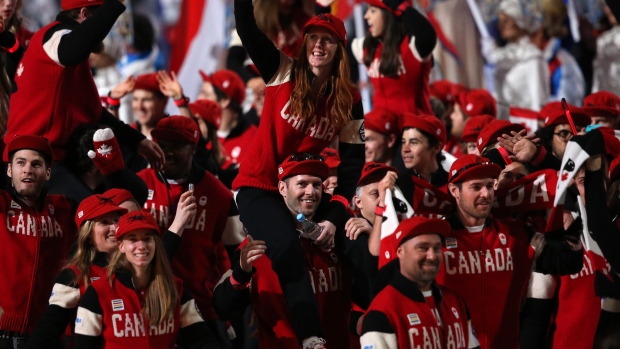Oct 1, 2014
Westhead: Before Sochi, Canadian government enacted murdered athletes scenario
The Canadian government prepared for the possibility that Canadian Olympic athletes might be kidnapped and murdered during the Sochi Winter Games earlier this year. As TSN Senior Correspondent Rick Westhead writes, documents obtained by TSN offer a glimpse at how the government prepares for events like the Olympics.

The Canadian government prepared for the possibility that Canadian Olympic athletes might be kidnapped and murdered during the Sochi Winter Games earlier this year.
Documents obtained by TSN under Canada's Access to Information act offer a glimpse at how the government prepares for events like the Olympics.
Little would seem to be left to chance.
The Department of Foreign Affairs, Trade and Development (DFATD), which oversees security preparations alongside the RCMP, worked through a number of possible scenarios in advance of the Sochi Games.
The most grisly hypothetical scenario envisioned by Canadian staff involved the kidnapping and murder of athletes.
In a government briefing labeled 'Abduction,' staff enacted a scenario where officials in Ottawa received a call from a concerned mother whose son, a member of the Canadian luge team, had not contacted her since the day after the men's luge final three days earlier.

The athlete, according to the mock scenario, had mentioned possibly taking a sightseeing trip with members of the U.S. team.
The following day, "friendlies in Sochi report that 2 U.K. technicians and 1 American athlete have also been reported as missing," the scenario says. Hours later, Russian TV reports that a local activist group claimed responsibility for abducting foreigners and demanded the games be canceled within 24 hours or the athletes would be executed.
Later the same day, after the release of a video of the hostages pleading for their lives, "a Russian anti-terrorist squad locates and attempts to rescue the hostages. All of the terrorists and two of the hostages (including the Canadian) are killed in the ensuing battle..."
"Discuss team actions/considerations."
Several sports marketing officials said there was little doubt that in that scenario, the Canadian Olympic team would be recalled to Canada, even if the Games continued.
"This isn't Munich," one of the marketing officials said. In 1972, 11 Israeli athletes and coaches were killed at the Munich Summer Games by Palestinian terrorists. The International Olympic Committee refused to cancel those games.
"The safety of our entire Canadian Olympic Team, including our athletes, coaches, support staff, volunteers, was always our main priority during the games," Caitlin Workman, a foreign affairs spokeswoman, wrote in an email to TSN. "A team of four Canadian consular experts were deployed to Sochi for the duration of the Olympic games and five additional accredited consular staff at the Canadian Embassy in Moscow stood to be deployed in Sochi in the event of an emergency.
"DFATD worked closely with the Canadian Olympic Committee, which had an Emergency Preparedness and Response Plan. The plan outlined roles and responsibilities and what to do in case of an emergency/crisis during the Games."

Canadian government staff also prepared for the possibility that a Canadian athlete might test positive for a banned substance, and prepared the Canadian ambassador to Russia and Minister of State for Sport to respond to questions.
Canadian officials also planned for the possibility that Russia—which has controversially passed anti-lesbian, gay, bisexual and transgender laws—might crack down on peaceful demonstrations held during the Games.
Both the foreign affairs department and Canadian Olympic Committee declined to say what their plans were in the event of a terror attack at the Games.
"Since the 2002 Salt Lake City Games, the COC has developed an Emergency Preparedness and Response Plan with guidance from the RCMP," said Marc-Andre Plouffe, a COC spokesman. "This plan has been refined and implemented at every games, including Sochi 2014."
